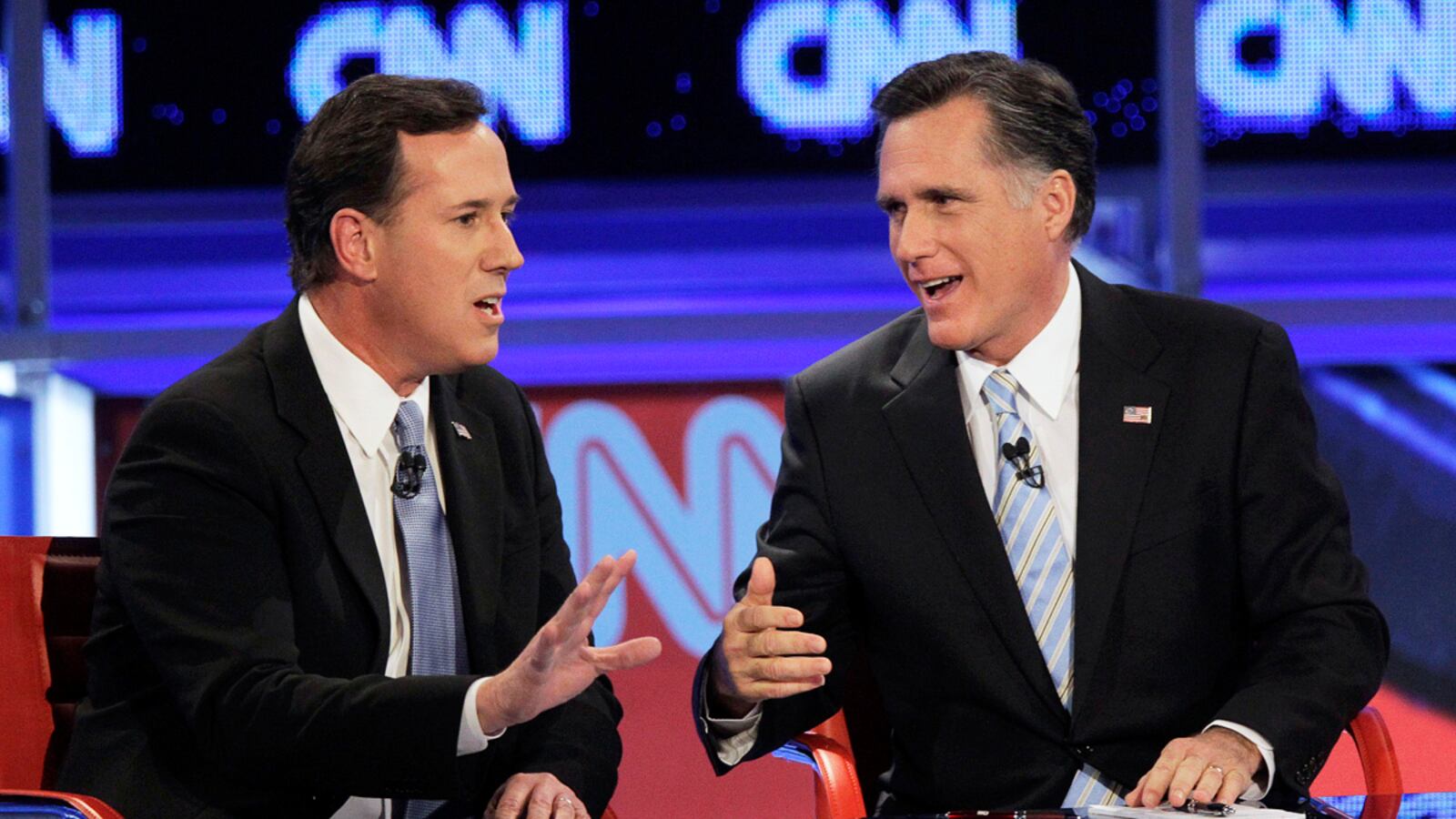Hours after Rick Santorum suspended his campaign for president Tuesday with his family at his side, a tieless, solo Mitt Romney took the stage in Wilmington, Del., with a too-big smile on his face. “It’s been a good day for me,” he told the crowd at the fabrication plant. “Senator Santorum has decided not to proceed with his campaign.”
Romney noted that Santorum would “continue to have a major role in the Republican Party.” And if Romney is lucky, part of Santorum’s new role will be giving him a few tips about how to improve as a candidate, including a much-needed make-under to take Romney’s image as a polished, PowerPoint-wielding technocrat and infuse a least a little of what Santorum has displayed in abundance for the last year—core, consistency, and compassion.
As Santorum showed during his speech earlier, and Romney reinforced later, the GOP field has lost something very important with Santorum’s departure—a passionate conservative who speaks from the heart, talking not only about his own life, but the lives of people across America who face the same struggles. The GOP is now left with Romney, a man at odds with his party’s base, but more important, a likely nominee at arm’s length from his party’s heart and soul.
Romney’s deficiencies were on display Tuesday, when both he and Santorum spoke at length about the economy, the area where President Obama will be most vulnerable in November.
Even as he withdrew from the race, Santorum framed improving the economy as a fight for a country like the one his grandfather left Italy for, when the American Dream was still possible, a country “willing to raise us up instead of trying to provide for us and do for us what we can better do for ourselves.” He also talked about people who have been left behind during the downturn: “Those who are out there paddling alone, who are feeling left behind and in some respects feeling hopeless.”

Romney talked about the economy, too, but instead of talking about the recession’s effects on people’s lives, he rattled off numbers like a CPA, listing the percentage of workers in businesses taxed at the individual tax rate (54 percent), the percentage of layoffs that affected women (94 percent), stats on military readiness, and an explanation of the repatriation tax for multinational American businesses.
And rather than focusing on what people need to emerge from the recession, he focused on what businesses need, including a president far friendlier to their point of view. “Saying you don’t like business is like saying you like omelets, but you don’t like eggs!” Romney joked.
The dueling speeches reinforced the sense that with Santorum, voters—including those who disagree with him—believe that every policy position and every campaign decision came from a core set of beliefs that he had developed over the course of his life. Romney, on the other hand, seems to approach policy decisions like a clinician. What do the numbers say? What if I do X or say Y? Santorum famously never had a pollster during his presidential run, but it’s hard to imagine Romney going a day without one, including Tuesday.
With a set of core beliefs, it has been easy for Santorum throughout the course of the campaign to stay consistent. While Romney has been defined by the changes in his positions over the years, Santorum’s speech Tuesday was remarkably like every town hall he held in Iowa and like the speech he gave to kick off his campaign nearly a year ago.
In June 2011, with his family by his side again, he spoke about his grandfather and the American Dream. He talked about “moral currency,” gas prices, the Obama administration’s record on federal spending, and “the rest of America out here trying to survive.”
It was that line, about “the rest of America,” that made Santorum’s campaign different from the others’ including Romney’s, then and now—an element of compassion that voters recognized and responded to and connected with.
“I was smart enough to figure out that if I understood and felt at a very deep level what you were experiencing across America and tried to be a witness to that, tried to be an interpreter of that, that your voice could be heard and miracles could happen and it did,” Santorum told his supporters as he left the race.
Romney, on the other hand, speaks in broad strokes, as he did Tuesday when he warned about President Obama’s “government-centered society,” and made a pitch for what he wants instead—“a free and opportunity-based nation.”
It’s not exactly morning in America, and it has clearly not won over all Republicans’ hearts and minds.
The bad news for Romney is that many of Santorum’s strengths are hard to learn. Romney is never going to be born the grandson of a coal miner, and he’ll never struggle to succeed or survive the way so many Americans do.
But like Santorum and like Barack Obama before him, Romney can talk to people who are going through the fire, who feel alone or hopeless, and he can listen to their stories, understand their lives, and infuse his campaign with the humanity that has been missing so far.
With his vast fundraising network behind him and a business-friendly message, Romney will win the Republican nomination. But without more of a core and more compassion for the people he says he wants to lead and without evolving as a candidate, it’s unlikely Romney will win again.






